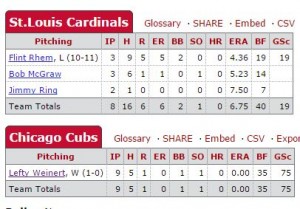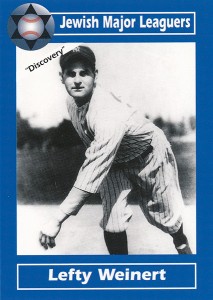The 16 Jewish Cubs
By Scott Barancik, Editor
On September 5, 1927, Lefty Weinert tossed a 6-1, complete-game win over the St. Louis Cardinals in the first game of a doubleheader at Wrigley Field, yielding 5 hits and no earned runs.
It wasn’t just the 25-year-old southpaw’s Chicago Cubs premiere. It also marked the very first Jewish appearance in this storied franchise’s history.
Another lengthy dry spell would follow. The next Jewish Cub didn’t appear until September 7, 1942, when 23-year-old third baseman Cy Block went 2-for-4 with an RBI double in his Major League debut.
In time, the numbers grew. Through 2016, a total of 16 Jewish players had worn a Cubs uniform. The most recent: outfielder Ryan Kalish, who first played for Chicago in 2014 and earned a .444 on-base percentage in 10 plate appearances during the 2016 regular season.
Jewish Cubs
- Ryan Kalish, OF (2014, 2016)
- Scott Feldman, P (2013)
- John Grabow, P (2009-11)
- Sam Fuld, CF (2007, 2009-10)
- Jason Marquis, P (2007-08)
- Adam Greenberg, CF (2005)
- Andrew Lorraine, P (1999-2000)
- Jose J. Bautista, P (1993-94)
- Ken Holtzman, P (1965-71, 1978-79)
- Dave A. Roberts, P (1977-78)
- Steve Stone, P (1974-76)
- Art Shamsky, 1B (1972)
- Ed Mayer, P (1957-58)
- Hy Cohen, P (1955)
- Cy Block, 3B (1942, 1945-46)
- Lefty Weinert, P (1927-28)
The roster of Jewish Cubs is dominated by pitchers. Over the decades, a total of 11 hurlers have combined for 165 wins against 156 losses and a 4.07 ERA. Kenny Holtzman tossed two of the franchise’s 10 no-hitters and racked up 80 wins, tying him for 23rd-most in Cub history. Steve Stone, who also pitched for the White Sox, played three seasons with the Cubs before going on to earn a Cy Young Award with the Baltimore Orioles.

Lefty Weinert
's Chicago Cub debut on September 5, 1927 (click for full box score)" width="300" height="209" srcset="http://www.jewishbaseballnews.com/wp-content/uploads/2016/11/weinert-box-300x209.jpg 300w, http://www.jewishbaseballnews.com/wp-content/uploads/2016/11/weinert-box-120x84.jpg 120w, http://www.jewishbaseballnews.com/wp-content/uploads/2016/11/weinert-box.jpg 406w" sizes="(max-width: 300px) 100vw, 300px" /> A partial box score from Lefty Weinert’s Chicago Cub debut on September 5, 1927 (click image for full box score)Pitchers are so dominant on the list that they account for 75 percent of all at-bats by Jewish Cubs — and eight of nine Jewish home runs. Position players have hit .253 with a .343 on-base percentage for the Cubs but managed just one home run in 328 combined at-bats, a solo shot by CF Sam Fuld on the last day of the 2009 regular season.
Art Shamsky burned the Cubs twice. In 1969, the outfielder hit .300 with the New York Mets to help deliver Chicago its most devastating late-season collapse. In 1972, in the twilight of his career, Shamsky managed just two hits in his only 16 at-bats as a Cub.

Ryan Kalish played for the Cubs in 2014 and 2016
Theo Epstein, the Cubs’ president of baseball operations, assembled the roster that led to the team’s 2016 World Series triumph. There were no Jewish players in uniform during the Cubs’ playoff run, however. Kalish, who hit .368 at Triple-A in 2016, was left off the Major League roster and declared his free agency on October 11.
There was one Jewish Cub in a World Series, if only briefly. Cy Block entered Game 6 of the 1945 Series against Hank Greenberg‘s Detroit Tigers as a pinch-runner in the 9th inning with the score tied 7-7. Although he didn’t cross home plate, Chicago went on to beat Detroit 8-7 in 12 innings despite a Greenberg home run.
Detroit, of course, won Game 7, launching what would be a 70-year World Series drought for the Cubs that would finally end, gloriously, in 2016.
# # #
Get your Jewish Baseball News updates via e-mail










